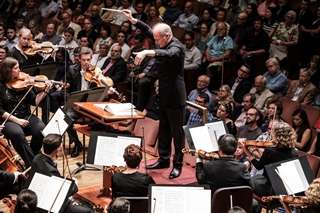|
Back
Folk-Themed Season Farewell for Noseda Washington
The Kennedy Center
06/06/2019 - & June 8, 9, 2019
Aaron Copland: Billy the Kid Suite
Manuel de Falla: Seven Popular Spanish Songs
Antonín Dvorák: Symphony No. 9 in E minor, “From the New World”, Opus 95
Isabel Leonard (mezzo-soprano)
The National Symphony Orchestra, Gianandrea Noseda (conductor)

G. Noseda (© Jati Lindsay)
Perhaps the most distinctive feature of Thursday’s NSO concert was the quality of the playing, which was here at least as good as it had been all season: generally quite robust, unified, and agile. The familiarity of repertoire (the majority of it, at least) could not have hurt. As Noseda—in the last program he conducts in Washington this season—admitted in his introductory remarks, the orchestra knew the opener, the suite from Copland’s ballet Billy the Kid, better than he, who was conducting it for the first time. Certainly there was nothing at all tentative about the performance, which brought elegance and vigor in equal measure; the strings sounded full and fairly warm, if not quite lush, and everyone on stage seemed to enjoy themselves. One sensed that Noseda was trying to emphasize the Continental sophistication and refinement that lies alongside the more rustic American folk elements of the score, and the results were compelling.
Manuel de Falla’s Seven Popular Spanish Songs brought much to enjoy as well, not least mezzo-soprano Isabel Leonard’s impressively varied sense of characterization and all-around musicality. Unfortunately, she did not always project over the orchestra as well as one would have liked. But this and her encore, Agustín Lara’s unpublished Granada, both brought a torrent of applause. Leonard’s reputation as an excellent Mozart singer testifies to her obvious musicianship; I only wish I could have heard her better more of the time.
I do not like to hold a warhorse’s popularity against it, but I must admit that when it comes to Dvorák’s “New World” Symphony, perhaps the most beloved (and ubiquitous) of all symphonies, the bloom is off the rose for me. To my ears, all of those pentatonic scales wear out their welcome quickly, and in particular the famous faux-spiritual in the second movement does not lend itself especially well to symphonic development. That said, I well remember the thrill of hearing the work the first few times, and the least a conductor can do for jaded audience-members (of course, not all are jaded!) and musicians alike is to bring as much imagination and energy to the score as possible. Fortunately, Thursday’s performance was not simply phoned in. Noseda emphasized contrasts—often unexpected ones—in the first movement, eliciting Brahmsian lyricism where one is accustomed to more rhythmic angularity and infusing some of the more obviously lyrical passages with rhythmic tension and a sense of hesitation. As one expects from Noseda, however, climaxes were consistently thrilling, which made the final two movements quite gripping. If the slow movement was often a bit static, this seems to me (as I have indicated above) rather the composer’s fault than the conductor’s. In short, while I cannot claim that Noseda and his alert, energized orchestra wholly reinvigorated the music for me, there was nothing to complain about interpretively, and the work’s many fans had every reason to leave the hall heartily satisfied.
Samuel Wigutow
|